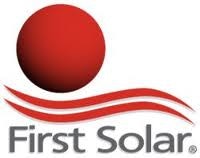

A bit about the company and what it does
First Solar is one of the leading designers and manufacturers of solar PV (photovoltaic) modules. Through their proprietary thin-film technologies, the company produces their modules with the least possible amount of material, and is constantly breaking its own efficiency records. Last year, First Solar, Inc. (NASDAQ:FSLR) produced about 1.9 gigawatts of solar modules.
The solar industry is adapting to the current economic climate (this is a good thing)
Most of the pessimism that caused the dive in First Solar’s share price last year was caused by two things. First, there has been a tremendous amount of oversupply in the industry for several years now, mostly due to Chinese solar companies. Second, pricing of solar modules plummeted even more than would be expected, due to the discontinuation or reduction of solar incentives and subsidies around the globe.
In regards to the first issue, the overcapacity issue seems to be taking care of itself somewhat with the exit of several of the smaller players from the industry, and reduced production from the larger players. Additionally, the large Chinese players such as Trina Solar Limited (ADR) (NYSE:TSL) and Suntech Power Holdings Co., Ltd. (NYSE:STP) have greatly cut production to more reasonable levels as a result of reduced demand from Europe.
As far as the second issue goes, I view the current trend toward declining global incentives to be very healthy for the long-term growth of the solar industry. With decreasing incentives and climbing sales, I get the impression that solar is indeed becoming more desirable and competitive with other forms of power.

Long-term growth
Over the coming years, as the price of solar systems becomes more affordable, demand should increase significantly. Since First Solar, Inc. (NASDAQ:FSLR) continues to beat its own efficiency records, they should be able to lead the market in both affordability and profit margins. Currently, First Solar’s manufacturing costs are around $0.68 per watt, and the company believes that it can achieve a cost per watt of under $0.50 by the end of 2015, while at the same time increasing efficiency. This level of price reductions will be passed to the consumer, and this should provide increasing sales for years to come.
Numbers and alternatives
Now, as the share price of First Solar has drastically increased over the past year, let’s take a look at what this means for new investors and what other choices are out there. First Solar, Inc. (NASDAQ:FSLR) trades at a seemingly cheap P/E of just 10.3 times TTM earnings, but the company is not as cheap as this makes it seem. Due to lower selling prices, margins are projected to erode a bit, with gross margins expected to gradually fall from around 25% to about 17% over the next two years. As a result, First Solar’s earnings are expected to drop from $4.90 last year to $4.13 and $3.29 in 2013 and 2014, respectively. After this, however, margins are expected to stabilize and sales will continue to grow, and the consensus calls for $4.02 per share in 2015.
For those who may be uncomfortable investing in a pure solar play, there are several large corporations with significant solar exposure, such as General Electric Company (NYSE:GE) and 3M Co (NYSE:MMM). General Electric has an entire solar division, which features a variety of solar products, such as solar inverters, thin film solar panels, and a range of services such as smart grid integration. The company provides products and solutions for applications ranging from roof-integrated systems all the way to large-scale power plant design. The company’s size and strength also should provide it with a nice competitive advantage when it comes to materials and labor costs.
3M Co (NYSE:MMM) has been producing solar films for about 30 years, and formally created a renewable energy division in 2009. That same year, 3M Co (NYSE:MMM) began manufacturing its Solar Acrylic Foam Tapes, which are designed to help the cost and durability of solar panel constructions. The company has recently announced plans to build a new manufacturing site for solar materials in China, indicating an expanded interest in the growing sector.
Final words
The bottom line is that an investment in First Solar, Inc. (NASDAQ:FSLR) requires a great deal of patience. This company will not make you rich overnight, but represents a chance to invest in what could very well be the next big energy technology while it’s still in its early stages. If all goes well for the industry, an investment in First Solar now could be like investing in oil companies in the early 1900’s. Before jumping in, I would wait until after the company issues its earnings report on Monday, July 29, to get the most up-to-date picture of the state of the company and solar industry.
The article This Is Still the Best Solar Play, Even After the Gains originally appeared on Fool.com and is written by Matthew Frankel.
Matthew Frankel has no position in any stocks mentioned. The Motley Fool recommends 3M Co (NYSE:MMM). The Motley Fool owns shares of General Electric Company (NYSE:GE). Matthew is a member of The Motley Fool Blog Network — entries represent the personal opinion of the blogger and are not formally edited.
Copyright © 1995 – 2013 The Motley Fool, LLC. All rights reserved. The Motley Fool has a disclosure policy.





